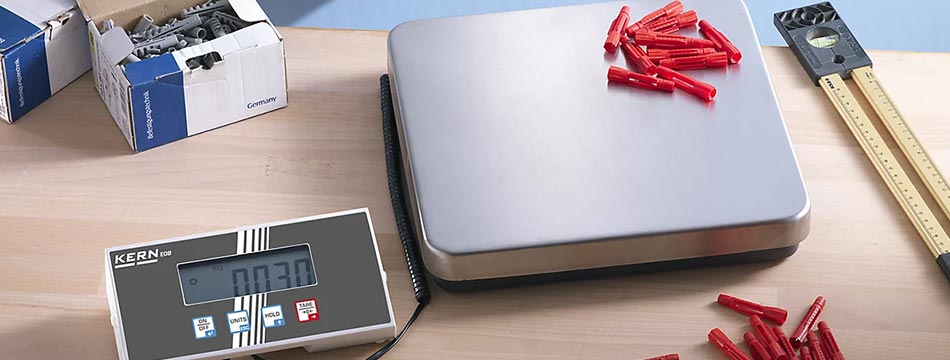
Sturdy and versatile, platform scales are used to measure various bulky objects from odd-shaped parcels to industrial equipment to livestock. There’s no doubt about the usefulness of large platform scales within sectors such as manufacturing, agriculture, warehousing, retail, medical, construction, waste management, automotive, R&D, and catering. Nevertheless, knowing which model is right for you and your organisation can be tricky. In this guide, we’ll detail the various applications of platform scales and provide pointers on what to look for when choosing sets for your business.[1]
Quick Links
- What Are Platform Scales?
- How Do Platform Scales Work?
- Why Are Platform Scales Good?
- Where Are Platform Scales Used?
- Top Tips on Choosing the Best Platform Scales
- Recommended Kern Industrial Platform Scales
- Further Information
What Are Platform Scales?
Offering a wide, flat weighing surface typically bigger than those available on bench scales, large platform scales are high-capacity weighing balances that tend to be used in rugged environments such as warehouses, farms, medical facilities, and food/catering organisations. They are ideal for weighing bulky items, animals, or individuals who cannot use standard scales. Many industrial platform scales can also be used for counting, check weighing, and percentage weighing applications.
Often supplied with a separate weight indicator/display, which may be moved or mounted as necessary, platform scales are deliberately diverse in design to meet the demands of many sectors. To this end, they are available in various sizes; with or without wheels; optional ramps; and different platform designs.
How Do Platform Scales Work?
Like most balances, floor scales include several load cells within the weighing platform. These sensors convert the force exerted on them into a weight.
To use floor scales, first, the object to be weighed is loaded onto the platform, ensuring its centre of gravity is in the middle of the balance. The weight of the object is then indicated on the display. Some large platform scales can be used for counting, check weighing, and percentage weighing, while others offer the option to save, transfer, or print data.
Why Are Platform Scales Good?
Ease of accessibility means industrial platform scales are perfect for weighing bulky objects often encountered in manufacturing, automotive, and warehousing. Similarly, flat, wide platforms with optional ramps make weighing livestock, pets, and patients in wheelchairs simple.
The durability of floor balances, particularly industrial platform scales, ensures they're ideal for the repetitive weighing of heavy objects and can be used in rugged environments.
Precise weighing, as well as options for counting, check weighing, and percentage weighing, make large platform scales suitable for multiple applications in various industries, meaning companies can maximise profitability and maintain compliance with regulations. Furthermore, their ease of operation helps to improve efficiency and productivity.
Where Are Platform Scales Used?
Diverse in design and capability, platform scales provide a solution to numerous problems across several sectors, from weighing oversized items and farm/domestic animals to counting pieces and calculating costs.
Manufacturing & Industrial

Industrial platform scales are critical to guaranteeing quality control and accurate inventory. They are used to weigh raw materials, parts, and finished products.
Agriculture & Farming

Large platform scales are advantageous when weighing livestock, produce, and feed. As a result, farmers can use large platform scales to monitor animal/produce weights.
Warehousing & Logistics
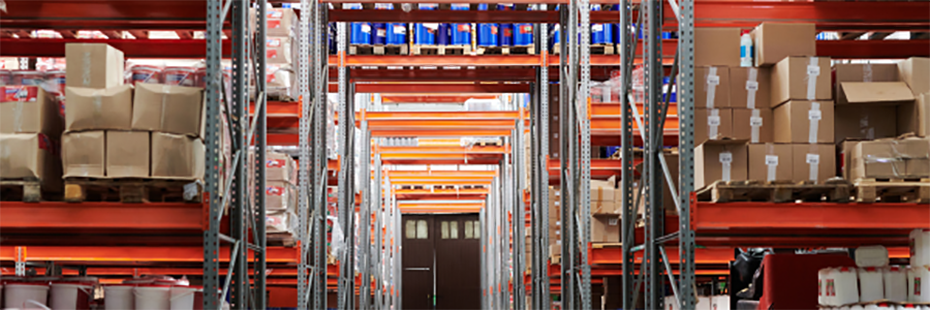
As industrial platform scales can be used to weigh packages, pallets, and freight, warehouses and logistics centres use them to check shipments comply with weight regulations and to calculate shipping costs.
Retail & Wholesale
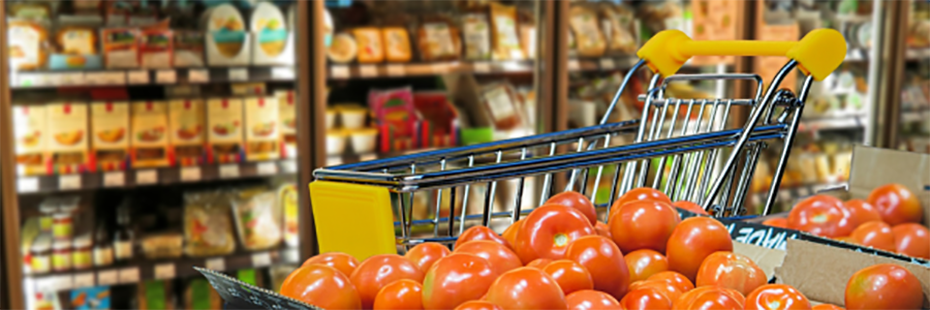
The cost of produce sold by weight, such as fruits, vegetables, meats, and sweets, can be quickly calculated using platform balances. In fact, many platform scales offer a dedicated function for this purpose.
Healthcare

Large platform scales make it easy to weigh patients with mobility issues or those who struggle to use standard scales.
Veterinary

Using standard scales to weigh pets, such as cats, dogs, and rabbits, is difficult. However, large platform scales allow animals to be lifted or led onto the weighing balance, making measurements quick, easy, and stress-free.
Construction

Bulky building materials, like cement, sand, and other heavy components, can be conveniently weighed using industrial platform scales.
Recycling & Waste Management

Recycling and waste management companies use industrial platform scales to manage loads and comply with regulations.
Automotive

Automotive garages and manufacturers use industrial platform scales to weigh vehicles and parts. Consequently, they can maintain compliance with safety and regulatory standards.
Science & Research

Scientific and research laboratories often have to determine the precise weight of big items. Large platform scales provide a simple solution to this.
Hospitality & Food Service

Platform balances are critical for precisely measuring ingredients and portion sizes, helping catering facilities to remain profitable.
Top Tips on Choosing the Best Platform Scales
As previously indicated, platform scales provide solutions across numerous sectors. Still, they are a significant expenditure. Therefore, to guarantee a return on investment, you should contemplate the following nine criteria when choosing a suitable platform balance for your business.
1.) Application
The first thing to consider is the size, maximum weight, and ruggedness of the items you anticipate weighing. This will influence the dimensions, range, and durability of your chosen platform scales. Subsequently, you may wish to think about the purpose of your floor balance, for example, do you only need to ascertain precise weights, or will you require a counting or price conversion function?
2.) Budget
Most platform scales offer companies a quick return on investment as they improve convenience, precision, and efficiency, thereby maximising productivity. However, it is always important to offset your organisation's demands against its budget constraints. For example, you may be able to balance affordability with capability by selecting a platform scale that meets your weighing obligations but does not include added functionality, such as counting, that would be redundant in your business.
3.) Resolution
Resolution also affects the price of platform scales. The resolution is the smallest weight the balance can indicate. For instance, if a scale has a resolution of 1g, the readout will not change if an item weighing 0.5g is placed on the platform. This is because it cannot indicate any weight or weight change that is smaller than 1g. It is therefore imperative that you consider the degree of precision necessary; i.e., do you need to measure down to the nearest 0.1g or the nearest 1g? The higher the resolution (with 0.1g being higher than 1g in this instance), the more accurate the reading but the more expensive the scale.
4.) Weighing Range
When purchasing a platform scale, contemplate the minimum, maximum, and average weights of the objects you are likely to be measuring. This is to ensure you select a balance with a range capable of accommodating your application. Another factor to keep in mind is your preferred measurement units, e.g. metric, imperial/non-metric, or both.
5.) Platform Size
Think about the size of the objects you will be weighing. To guarantee measurement accuracy, articles should not overhang the scales; their centre of gravity must be in the centre of the platform. It’s recommended that you choose a balance that is slightly larger than necessary. This means it can be used to weigh your most sizeable items while futureproofing against applications involving even bigger pieces. Nevertheless, remain mindful of choosing a scale that is significantly greater than the size you require, as the broader the platform the more expensive the scale. Selecting a platform scale that is far too huge for your application could prove more costly than useful.
6.) Scale Design & Portability
To meet a variety of industry demands, platform scales are available in an array of designs, including:
- Floor mounted
- Standalone
- Heavy duty
- With a column-mounted display
- With a wall-mounted display
When choosing your platform scales, consider whether you want a separate display unit and the portability likely to be necessary within your business. For instance, some warehouses or logistics sites may like floor-mounted platform scales whereas others might prefer floor balances that can be moved about the site. If transportability is a priority, select platform scales that are light enough to be moved by your team and have dimensions compatible with your site’s doors, entrances, and exits. You will also need to pay attention to how the balance is powered. If you anticipate moving the units frequently, battery-operated balances remain functional even when there is no power outlet. Consequently, they are a better choice for these applications.
7.) Durability
Large platform scales are often used in rugged environments from farms to factories, warehouses, and commercial kitchens. As such, you must select a scale capable of withstanding the demands of daily tasks. As repetitive loading and unloading can damage scales’ functionality, investing in a more expensive but robust unit may be more cost-effective in the long term. A good indicator of a platform scale’s resilience is its IP (Ingress Protection) rating which denotes its susceptibility to dust and water ingress.
Another factor to consider is the construction of the platform scale. For example, a scale made from smooth stainless steel with a high ingress protection rating is ideal for weighing animals and food as it is resistant to dirt and water damage while remaining easy to clean. However, this design may not be suitable for weighing patients in wheelchairs or bulky goods such as drums. Instead, a large platform scale with a ramp for easy accessibility and/or a diamond grip weighing surface for added tred is preferable for these applications.
8.) Ease of Use
Ensure you choose a platform scale that offers a simple method of determining and recording results; overly complex scales can lead to inefficiency, jeopardising your business’ productivity and profitability.
9.) Data Transfer
Finally, if record-keeping is a crucial aspect of your application, you may wish to invest in a scale that can store multiple readings. Think about the memory size and data transfer method you would like. For example, do you want platform scales with a printer connection or would you prefer to export data to a PC/laptop via a USB, Bluetooth, or wireless interface?
Recommended Kern Industrial Platform Scales
A leading manufacturer of balances, Kern offers several platform scales optimised for an array of sectors and applications. Below are four of Kern’s best-selling industrial platform scales.

Kern IFC Industrial Platform Scale
- Tough - suitable for use in harsh industrial environments
- Choose up to three optional interfaces (RS-232, USB, Ethernet, Wi-Fi, Bluetooth, analogue module)
- Optional memory
- Kern Communication Protocol
- Real-time clock
- Simplified battery replacement
- Stainless steel weighing plate
- Painted steel base
- Silicone-coated aluminium load cell
- IP65
- Ideal for industrial applications
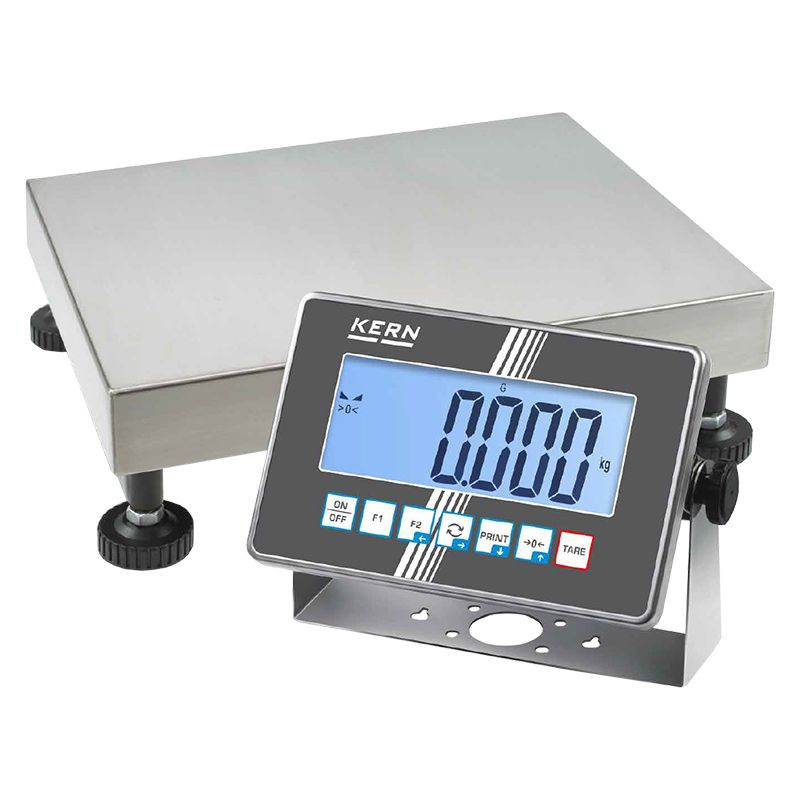
Kern IXC Industrial Platform Scale
- Tough - suitable for use in harsh industrial environments
- Choose up to four interfaces(RS-232, USB, Ethernet, Wi-Fi, Bluetooth, analogue module)
- Optional memory
- Kern Communication Protocol
- Real-time clock
- Simplified battery replacement
- Stainless steel weighing plate
- Painted steel base
- Silicone-coated aluminium load cell
- IP65
- Ideal for industrial applications
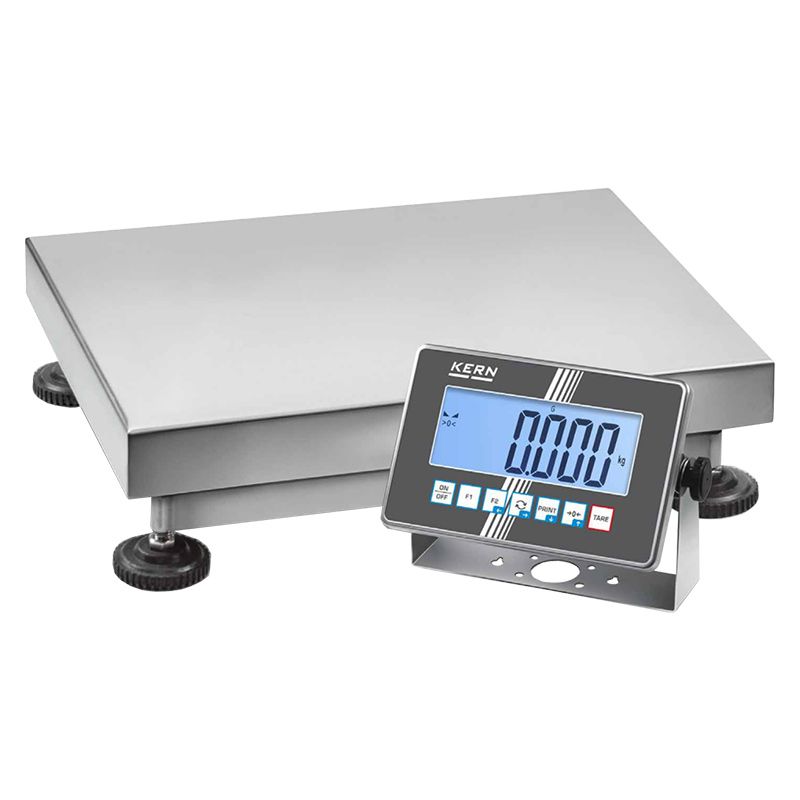
Kern SXC Industrial Platform Scale
- Tough - suitable for use in harsh industrial environments
- Choose up to four interfaces(RS-232, USB, Ethernet, Wi-Fi, Bluetooth, analogue module)
- Optional memory
- Kern Communication Protocol
- Real-time clock
- Simplified battery replacement
- Stainless steel weighing plate
- Painted steel base
- Hermetically welded stainless steel load cell
- Stainless steel display unit with an integrated power supply
- Display unit can be mounted on a stand
- IP68
- Ideal for industrial applications
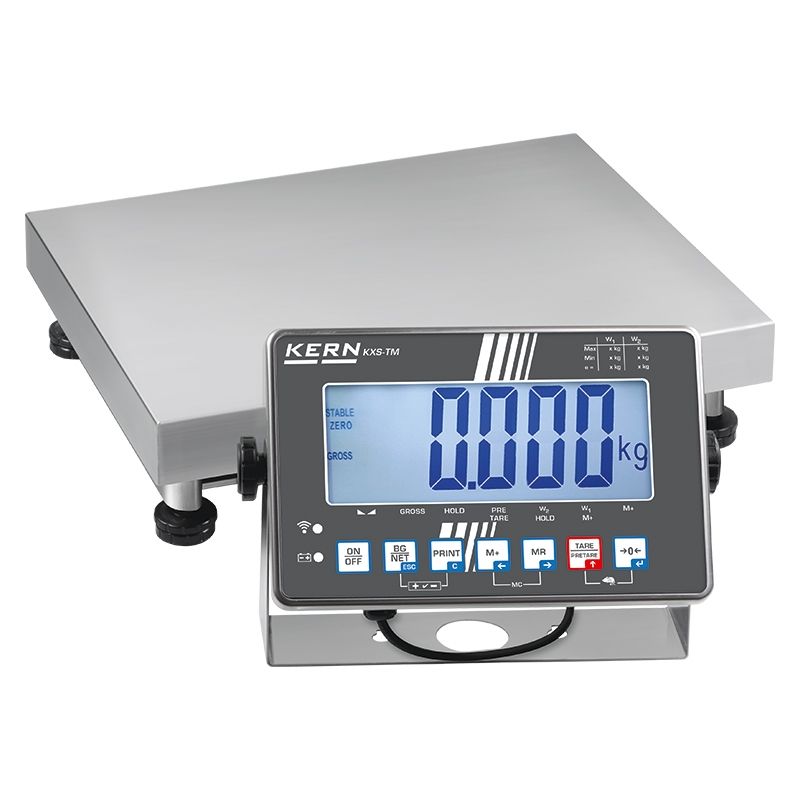
Kern SXS Industrial Platform Scale
- Tough - suitable for use in industrial and food environments
- Optional RS-232, RS-485, and Bluetooth interfaces
- Internal rechargeable battery
- Stainless steel, earthed weighing plate
- Silicone-coated steel load cell
- Stainless steel display unit with an integrated power supply
- Display unit can be mounted on a wall
- IP67/68
- Ideal for industrial and food applications
Fear not if these Kern balances don't meet your requirements. At PASS Ltd, we offer a comprehensive array of Kern platform scales.
Click to Find Your Perfect Kern Platform Scales
Further Information
For more information about platform scales, including Kern models, please contact our Sales team on 01642 931 329 or via our online form.
In the meantime, you can browse our extensive offering of Kern tools, including platform scales, below.
Alternatively, for more information about Kern's counting scales, please consult our dedicated guide.
Introduction to Kern Counting Scales: What Are They & Do You Need Them?
[1] Information for this blog was gathered from the following sources:
- Active Scales, How to Choose the Right Platform Scale, last accessed 24 July 2024.
- Adam Equipment, A Guide on Platform Scales, last accessed 24 July 2024.
- Bob Sandor, ‘How to Choose Platform Scales’, Tovatech, last accessed 24 July 2024.
- Robert Taylor, ‘Platform Scales: A Buyers Guide’, Inscale, last accessed 24 July 2024.


